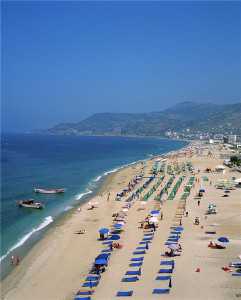By Yochi J. Dreazen
Updated: October 5, 2011 | 11:26 a.m.
October 5, 2011 | 11:25 a.m.
The U.S. is moving ahead quickly with a controversial new radar system in Turkey designed to counter a potential missile threat from Iran, a senior U.S. military official said on Wednesday.
Lt. Gen. Mark Hertling, the top Army officer in Europe, told reporters that a team of soldiers was currently in Turkey’s Kürecik district to survey the proposed location of the radar array. Hertling said the U.S hoped to have the radar system installed and operational by the end of the year, though he hinted that date could slide into 2012.
The Turkish system will be paired with a parallel radar array in Poland as part of the Obama administration’s escalating effort to protect European allies – as well as the U.S. military personnel stationed on the continent – from Iranian missile strikes. Iran has in recent months successfully tested next-generation missiles capable of hitting targets throughout Europe.
Hertling downplayed Turkish opposition to the new installation, arguing that popular protests there failed to attract any large crowds. At one recently organized protest “around nine people showed up,” he told reporters in Washington. “I think the Turks are very happy to have us there.”
But there’s no question the project is deeply controversial within Turkey and threatens to further strain the already-frosty relationship between Washington and Ankara.
The agreement to build the new radar array, which had been under negotiation for months, was finalized in mid-September. Turkey’s opposition Republican People’s Party almost immediately condemned the plan for putting Kürecik at risk of attack and providing a deal to share data with Israel, which is increasingly unpopular within Turkey.
“The government, which appears to be in a row with Israel in front of the curtain, has turned Turkey into a shield for Israel behind the curtain,” Kemal Kılıçdaroğlu, the party’s leader, said in a press release on Sept. 21.
The Turkish government, which has been steadily downgrading its ties to the Jewish state, responded to the domestic criticism by claiming Israel would receive absolutely no radar data from the site because it is not a member of NATO.
Speaking in Washington late last month, Turkish Prime Minister Recep Tayyip Erdoğan insisted Pentagon claims that the system would be used to help protect Israel had been “corrected.” But U.S. officials privately maintain that data will indeed be shared with Israel, which is thought to face the greatest threat from Iran.
Turkey has also refused to second U.S. claims that the site was primarily designed to shield Europe from Iranian missiles. Ankara persuaded NATO last year to remove from its formal communique about the site any language suggesting the system was being installed to protect against Iran.
The delicate diplomatic balance that the U.S. has been treading with Turkey over the site is the latest controversy to cloud administration plans for installing anti-missile systems in Europe. In 2009, the Obama administration abruptly dropped a long-standing plan to deploy radar arrays in central Europe capable of defending against long-range Iranian missiles, arguing that simpler systems designed to protect against shorter-range missiles would suffice. Instead, the White House said it would install lower-tech systems in Poland and the Czech Republic.
The plans sparked deep public opposition within the Czech Republic, whose leaders felt they were being given too minor a role in the broader missile defense system. Prague formally abrogated its agreement with the U.S. in June and canceled plans to host the array on its territory. In addition to the systems being installed in Turkey and Poland, U.S. officials are talking with Romania about installing radar equipment there.
via Despite Tensions With Turkey, U.S. Races Ahead With Controversial Radar System – Yochi J. Dreazen – NationalJournal.com.


Leave a Reply